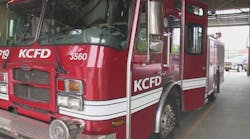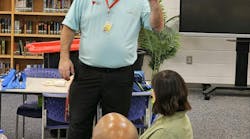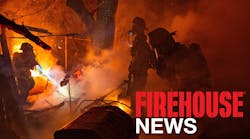Those first-in responders perform their duties and mitigate the incidents. If they require critical incident stress management (CISM), it is usually available to them. However, what becomes of the civilians who are involved, directly or indirectly, in an emergency incident that may leave the scars of emotional trauma? Do we, as first responders, think about the emotional aftershocks to people who have been involved in traumatic incidents? What happens to them after you leave the scene of such an incident? Are their emotional needs being met after you return to quarters? In far too many instances the answer is no.
Many times during my long fire service career as a first responder and an incident commander, I felt a sense of inadequacy and helplessness as I cleared scenes of devastation and emotional trauma. Most of the time, no support networks were in place for those victims left standing in the aftermath of tragic circumstances. At a structure fire it was standard operating procedure to call the Red Cross to the scene to assist displaced residents with housing, furniture and clothing replacements. But who was there for the victims' immediate emotional welfare? Too often, it was no one.
Many times, I tried, unsuccessfully, to console people at fires that had cost them all of their possessions in a fire, or who had been involved in serious MVAs, or had looked upon the body of a loved one who had died suddenly of a heart attack. It was at those times that those emotionally traumatized people needed the assistance of a person trained in emotional trauma intervention.
Trauma Intervention Programs Inc. (TIP Inc.) was founded in 1985 by Wayne Fortin, a licensed mental health professional in the San Diego area. The idea was conceived and developed by Fortin after many of his clients who were involved in difficult personal loss cases told him of feeling alone, abandoned or ignored during and after their emotional traumas.
"The initial traumatic incident causes the primary damage and the manner in which the situation is handled causes the secondary (emotionally traumatic) injury that can be avoided," Fortin said. He also heard from first responders about their feelings after leaving distraught people alone immediately following MVAs and other damaging incidents.
TIP was highly successful in its formative years, and in 1989, Fortin established it as a non-profit organization dedicated to providing immediate support to people emotionally impacted by crisis events. He led TIP in a national competition for the Innovations in State and Local Government Awards in 1991. TIP won the innovations award and received a $100,000 award from co-sponsors, The Ford Foundation and Harvard University's John F. Kennedy School of Government, to replicate its services nationwide. Today, TIP Inc. operates 20 chapters in 150 cities and towns across America. More than 160 participating emergency agencies and over 800 TIP volunteers respond to the needs of a potential client population of 6 million individuals. TIP Inc. contracts with emergency agencies and its volunteers are on call 365/24/7.
In each chapter, citizen volunteers provide support to emotionally traumatized citizens immediately after a tragedy strikes. Hospital personnel, police officers, firefighters, EMTs and paramedics call for TIP volunteer assistance around the clock. TIP volunteers assist family members following natural or unexpected deaths; victims of violent crimes; disoriented or lonely elderly people; victims of MVAs; family members and other loved ones after a suicide; and anyone emotionally distressed by a crisis. Many emergency response agencies rely on TIP volunteers to provide the after-the-incident personal sensitivity that is so desperately needed and that emergency responders may not be able to give. TIP can provide "closure" for an incident and can help to quickly relieve first responders so that they can return to service.
TIP Programs
- Crisis Response Team. A team of well trained and certified volunteers who are called by emergency personnel to provide support to emotionally traumatized citizens on a 24-hour 365 day a year basis.
- Independent TIP Volunteer Program. A program that enables individuals to work as TIP volunteers in local communities where there is not an organized TIP program.
- Senior Crisis Team. A team of TIP volunteers who provide immediate support to seniors in crisis situations.
- TIP4kids. A program that assists children who have been emotionally traumatized.
- TIP Teens. A program that involves young people (ages 16-21) as active TIP volunteers.
- TIP National Emotional First Aid. A course designed for lay citizens and emergency responders who want to learn the skills necessary to help those who are emotionally traumatized.
- TravelersCare. A program that enhances the capacity of the travel industry to support travelers who have been affected by crisis events.
TIP at Work in Prescott Area
As an example of how TIP functions, let's examine the important role it plays in the Central Yavapai County area in Arizona. Central Yavapai Fire District (CYFD) Chief Dave Curtis is a progressive thinker. He was a Hotshot at the Prescott National Forest and volunteer firefighter in the CYFD before becoming a full-time career CYFD firefighter in 1979. He rose through the ranks and was promoted to chief in 1994. Curtis holds both associate of arts and bachelor of science degrees, and is a graduate of the Executive Fire Officer Program at the National Fire Academy. The CYFD employs 80 full-time fire personnel and 30 reserve firefighters operating from five stations and responding to 6,000 calls per year.
Curtis, seeing a need to do more for the victims and families of sudden tragic and traumatic events, initiated the first TIP chapter in Arizona in 2000.
"The most important reason that we explored programs like TIP was that we were observing a sense of helplessness and distress from our personnel after they returned from a traumatic incident," Curtis explained. "They saw victims, family members and other loved ones being left in a state of shock and not knowing what to do next after the emergency responders completed their tasks and returned to their respective stations. The responders felt that their missions were incomplete. So, we started asking ourselves, if we were truly providing total patient care that not only included any victims or patients, but the family members and other loved ones? We were concerned not only with the physical care of victims, but also their and their family's emotional well being. If the patient or victim knows that their family or loved ones are being cared for, they will be more relaxed and allow our personnel to treat them more easily.
He continued, "The TIP volunteers have filled this void so that we can give total patient care and try to relieve some of the emotional stresses involved. They handle the 'emotional first aid' at and following the emergency scene and provide a sense of order to those that require it. Also of great importance, the TIP volunteers enable the emergency response units to go back into service much faster than before by taking care of those that have been emotionally affected. The TIP volunteer has become an important part of our emergency services delivery system."
As TIP's Crisis Team manager, Susan Rutherford, RN, works 60 hours a week and is available 24/7. For her tireless dedication she receives $100 per month for expenses. Rutherford, a longtime resident of Prescott, AZ, joined TIP in 2000 and became a certified national TIP trainer in 2001. She became TIP's Crisis Team manager on 9/11.
"Last summer, I was called out as a volunteer to a house fire," Rutherford said. "No one was home at the time. I was waiting with the police officers for someone to come home. We knew there were two children and two adults that lived in the house. One of the children came home from school. While I was waiting with this child, the police radioed that they had found his mother a few streets away dead from a gunshot wound. The other adult in the house was not a parent. Once the other child got home from school, I stayed with the children for many hours. We also had other TIP volunteers comforting friends of the victim. It was one of the most difficult things I have had to help with. These children lost everything.
She added, "People appreciate the time and caring presence of the volunteers. We receive many thank-you letters. Here is one we received recently: 'This is very difficult to write about, but I so wanted to say thank you and express my appreciation I could not imagine anyone else I would have wanted to assist me at the hospital other than the (TIP) volunteer. While it is all quite a blurry memory - looking back, she was the friend at my side. Days later, when I realized that she was a volunteer, I was - and still am - amazed at the professionalism she showed. All family members who were with me each had their partners there with them to comfort them. Had it not been for the volunteer, I know I would have spent my time helping to console them and not have taken anytime to try to deal with my husband being gone so suddenly. As I recall, she never once took her eyes off of me nor left my side for a second. She listened - she held my hand - and showed me the compassion of a friend, sister and mother. Does she - and all your volunteers - even know how very much they are needed? What a horrific assignment to volunteer for! I guess they never know exactly what they will see until they get there - yet, they come anyway.' "
Rutherford continued, "My years working as an RN in a large teaching hospital gave me the insight I needed to know this was a much-needed program. In all my years of conferences, trainings and schooling, TIP training is the best I have ever experienced. The quality of the training makes the volunteers comfortable in knowing what to do and say when they are out in the field working. TIP volunteers are treated with respect and as professionals by the firefighters, police officers, EMT/paramedics and hospital personnel. This program would not work without the firefighters, police officers and nurses believing in TIP. Before TIP is ever called, a police officer, firefighter, EMT/paramedic or nurse sees a person experiencing a tragedy. They then call TIP so this person does not have to be alone during this terrible time."
Diana Cordes, the wife of a fire captain and who is a retiree from Arizona state government, was the first TIP Crisis Team manager in CYFD in 2000. She is currently the TIP Crisis Team assistant manager.
The Yavapai County TIP Chapter is staffed by 35 highly trained volunteers. They respond to 30 to 50 calls a month. TIP is automatically displayed on the emergency dispatch center's CAD screens and the on-call TIP volunteer is dispatched to selected incidents for quick response. The chapter is expanding its program to other jurisdictions beyond Prescott, Prescott Valley and Chino Valley.
For further information about the local program contact Rutherford at 928-708-7066 (pager) or e-mail her at [email protected]; for further information about the nationwide program contact Fortin at 714-314-0744 or at [email protected]. The TIP website address is www.tipnational.org.
Robert M. Winston, a Firehouse® contributing editor, is a 33-year veteran of the fire service and a retired Boston Fire Department district fire chief. He is a wildland/urban interface and structural fire service presenter and adjunct college instructor. Winston can be contacted at 928-541-9215 or e-mail [email protected].






